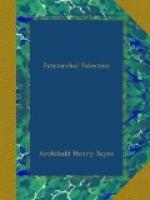“Then again,” we are told, “Abraham took a wife,” whose name was Keturah, and by whom he was the forefather of a number of Arabian tribes. They occupied the northern and central parts of the Arabian peninsula, by the side of the Ishmaelites, and colonized the land of Midian. It is the last we hear of the great patriarch. He died soon afterwards “in a good old age,” and was buried at Machpelah along with his wife.
Isaac still dwell at Lahai-roi, and there the twins, Esau and Jacob, were born to him. There, too, he still was when a famine fell upon the land, like “the first famine that was in the days of Abraham.” The story of Abraham’s dealings with Abimelech of Gerar is repeated in the case of Isaac. Again we hear of Phichol, the captain of Abimelech’s army; again the wife of the patriarch is described as his sister; and again his herdsmen strive with those of the king of Gerar over the wells they have dug, and the well of Beer-sheba is made to derive its name from the oaths sworn mutually by Isaac and the king. It is hardly conceivable that history could have so closely repeated itself, that the lives of the king and commander-in-chief of Gerar could have extended over so many years, or that the origin of the name of Beer-sheba would have been so quickly forgotten. Rather we must believe that two narratives have been mingled together, and that the earlier visit of Abraham to Gerar has coloured the story of Isaac’s sojourn in the territory of Abimelech. We need not refuse to believe that the servants of Isaac dug wells and wrangled over them with the native herdsmen; that Beer-sheba should twice have received its name from a repetition of the same event is a different matter. One of the wells—that of Rehoboth—made by Isaac’s servants is probably referred to in the Egyptian Travels of a Mohar, where it is called Rehoburta.
Isaac was not a wanderer like his father. Lahai-roi in the desert, “the valley of Gerar,” Beer-sheba and Hebron, were the places round which his life revolved, and they were all close to one another. There is no trace of his presence in the north of Palestine, and when the prophet Amos (vii. 16) makes Isaac synonymous with the northern kingdom of Israel, there can be no geographical reference in his words. Isaac died eventually at Hebron, and was buried in the family tomb of Machpelah.
But long before this happened Jacob had fled from the well-deserved wrath of his brother to his uncle Laban at Harran. On his way he had slept on the rocky ridge of Bethel, and had beheld in vision the angels of God ascending and descending the steps of a staircase that led to heaven. The nature of the ground itself must have suggested the dream. The limestone rock is fissured into steplike terraces, which seem formed of blocks of stone piled one upon the other, and rising upwards like a gigantic staircase towards the sky. On the hill that towers above the ruins of Beth-el, we may still fancy that we see before us the “ladder” of Jacob.




